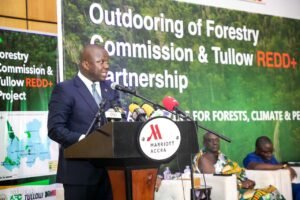
Vice-President Mahamudu Bawumia
Vice-President Mahamudu Bawumia has announced plans by the government to transition the country from the use of fossil fuel to renewable energy by 2070, calling on stakeholders in the energy sector to accelerate the production and utilisation of oil and gas reserves in the country.
He said Ghana had set a target of 2070 to fully transition from fossil fuels to renewable energy, stressing that that government remains fully committed to achieving net zero carbon emissions by the set year.
“We also have to take steps to accelerate the production and utilization of our oil and gas reserves. What this means is that, even though we want to contribute to reducing emissions, we are of the view that a balance must be struck and maintained in the context of our social, economic, and environmental requirements,” he stressed.
The Vice-President made the disclosure during the official opening of the 5th Edition of the Ghana International Petroleum Conference (GhIPCon) in Accra yesterday.
This year’s conference is dubbed “Energy Transition in the African Petroleum Downstream Context: Prospects, Challenges and the Way Forward”. It is being organised by the National Petroleum Authority (NPA) in collaboration with the African Refiners and Distributors Association (ARDA) under the auspices of the Ministry of Energy and the Ghana Chamber of Bulk Oil Distributors (CBOD).
Dr Bawumia emphasised that fossil fuels, particularly natural gas, will continue to be part of Ghana’s energy mix in the short term, whilst strategies will be put in place to increase the share of renewable energy in the mix from medium to long term.
A Deputy Minister of Energy, Dr Mohammed Amin Adam, recently said the government would continue to explore comprehensive and viable options to cater for the Ghana’s transition from fossil fuels to renewables.
He explained that the country was already putting in place measures that would ensure seamless energy transition, as Ghana joins in the race for net zero carbon emission.
Speaking to the media at the launch of the 2019 Ghana Extractive Industries Transparency Initiative (GHEITI) reports, he said key among these measures was the setting up of a National Energy Transition Committee (NETC) with the aim of developing a national energy transition policy.
Transition policy
The Deputy Minister said energy transition was a very important issue for the government and that was why it set up a committee to develop Ghana’s transition policy and strategy “so that we can transition at our own pace because it is like we are being rushed into it.”
He said most of the developed countries that had benefited from fossil fuel had developed their countries based on the natural resources.
In Ghana’s case, he said, oil was discovered in commercial quantities a few years ago and the country was being encouraged to transition to renewables.
“It took the world over 75 years to move from coal energy to fossil fuel yet we are being encouraged to take just 30 years to move to clean energy,” he noted.
Dr Adam stated that the country would continue to produce oil and gas because it needs revenue to support its developmental agenda.
Consequently, he said, the government would deploy mitigation programmes such as planting of trees and adherence to zero fleeing policy for gas.
“These are some of the measures we think we can implement to reduce our mitigation but at the same time continue to produce our natural resources,” he added.








